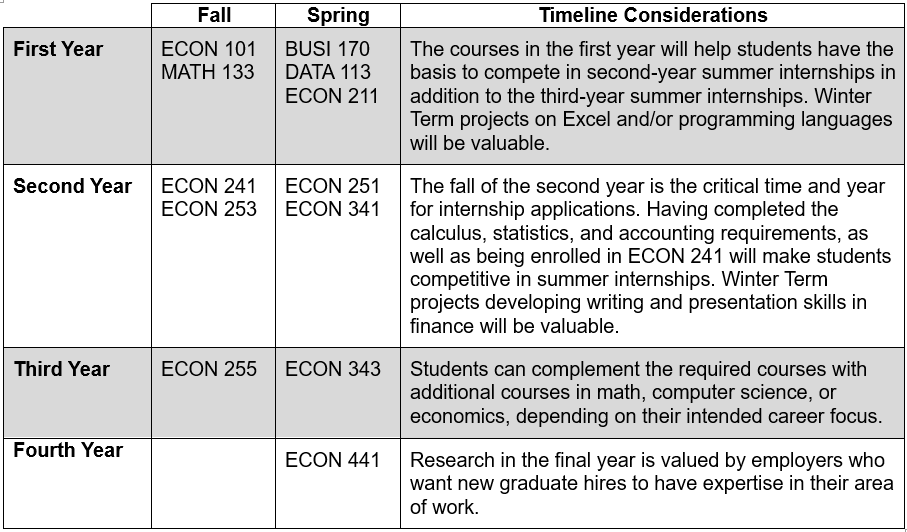| |
Feb 02, 2026
|
|
|
|
|
Course Catalog 2025-2026
Financial Economics Major
|
|
The major consists of a minimum of 11.5 full courses (or the equivalent).
Note: Students must earn minimum grades of C- or P for all courses that apply toward the major.
 View the catalog page for the economics department. View the catalog page for the economics department.
A major in financial economics provides students with a primary specialization in finance. Students will develop a comprehensive set of skills and knowledge that can be applied to a wide range of career paths in the financial industry.
|
Note(s) on Requirements
- Due to the high level of overlap between the requirements, students who major in financial economics may not also major in economics (with or without the mathematical economics concentration), minor in economics, or minor in finance.
- Students completing the half course BUSI 170 will only need 11.5 full courses to complete the major. Students completing the full course ECON 099 will need 12 full courses to complete the major.
- Financial economics majors who bypass ECON 101 will need to take an additional 200-level or higher economics (ECON) course. See transfer of credit section below.
- ECON 500 does not count toward the financial economics major.
Learning Goals
Students who successfully complete a major in financial economics will: - Appreciate the role of the financial markets to allocate resources and improve society’s welfare;
- Demonstrate an understanding of key financial concepts, processes, methods, and data that are essential in understanding modern problems and approaches in finance;
- Understand how accounting, economics, business, and mathematics underlie the mechanisms that drive financial market outcomes;
- Communicate and value the importance of ethics and governance of companies for the delivery of positive outcomes for society as a whole;
- Understand the importance of government policy and the legal system to correct and improve the outcomes of financial institutions and markets;
- Develop the critical thinking, oral/written communication, and leadership skills necessary to effectively communicate and address challenges in financial markets and institutions;
- Gain skills and experience in key software and data used in industry; and
- Reflect on and integrate economic and financial theories with their practice.
Transfer of Credit Toward the Major
The awarding of transfer credit is at the discretion of the department chair. Students majoring in financial economics must take at least two of the economics core courses at Oberlin. Students should obtain preliminary approval of transfer credit in financial economics from the department chair prior to taking courses elsewhere if they want them to count toward the major. Advanced Placement and International Baccalaureate Credit
The department does not give advanced placement credit. Students who have scored a 4 or 5 on both the AP Microeconomics and the AP Macroeconomics examinations, or who believe they have covered the material in ECON 101 through an International Baccalaureate program, may obtain permission from the department chair to bypass ECON 101 . Economics majors who bypass ECON 101 will need to take an additional 200-level or higher economics (ECON) course. Course Sequence Suggestions
.  Prerequisites to Note
- ECON 101 is a prerequisite for all further study in the department.
- The content of Calculus I is a prerequisite for almost all economics courses numbered 250 or higher, including ECON 253 . This may be satisfied through:
- ECON 253 and DATA 113 are prerequisites for ECON 255 .
Preparation for Post-Graduate Pursuits
Students planning graduate work in finance or financial economics are strongly encouraged to take as much work in mathematics as can reasonably fit into their schedules. A one-year sequence in calculus (MATH 133 and MATH 134 ), probability (MATH 335 ), mathematical statistics (DATA 336 ), and ECON 255 should be considered minimal preparation for graduate study in finance or financial economics. A course in time series analysis and probability and stochastic processes (MATH 338 ) is also encouraged. Students who plan to enter industry directly after graduation will also find these courses desirable. Honors in Financial Economics
The department puts special emphasis on the Honors Program in Financial Economics and ordinarily invites up to a quarter of its senior majors to participate. Invitations are extended toward the end of the junior year on the basis of general academic standing and work in the department up to that time. Interested students should consult with a member of the department. Students wishing to qualify for admission to the honors program must take ECON 251 , ECON 253 , and ECON 255 before the senior year. Detailed Major Requirements
Financial Economics Major Course Lists
|
|
|